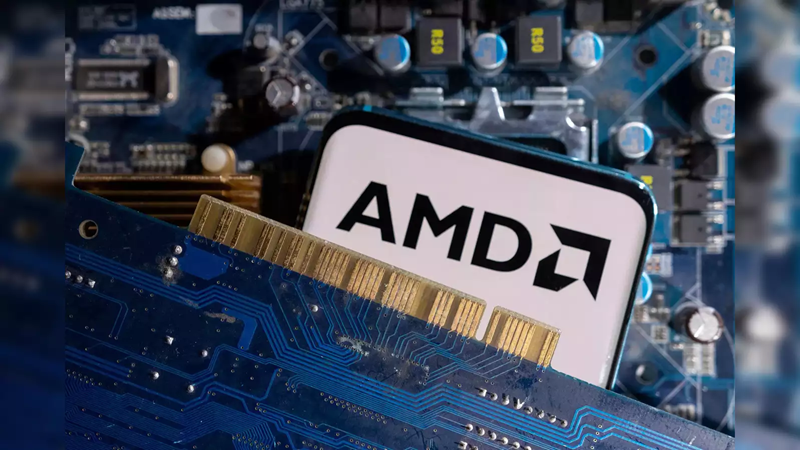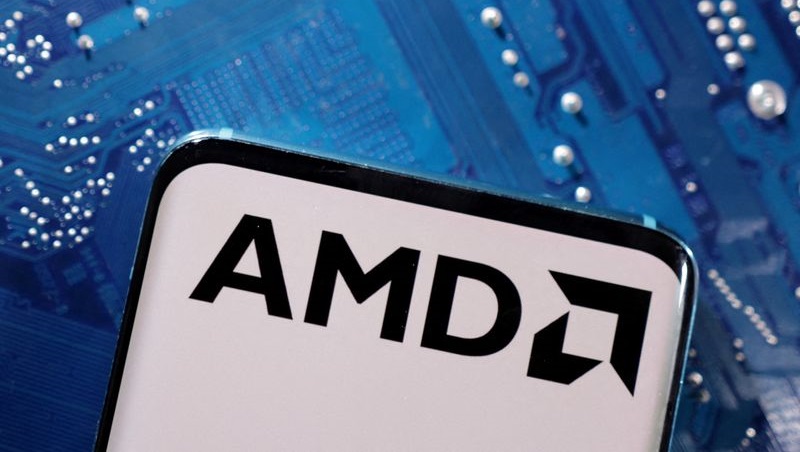AMD Stock Surges After Earnings Report Boosted by AI Chip Sales
In a significant development that underscores the surging demand for artificial intelligence technology, Advanced Micro Devices (AMD) has seen a notable upswing in its stock prices following the release of its recent earnings report. The boost in the stock market was primarily driven by robust sales of its AI chips, which are increasingly becoming a cornerstone of the company’s growth strategy. As corporations across sectors such as healthcare, finance, and technology increasingly leverage AI to boost operational efficiency and unlock new revenue streams, the demand for AMD’s AI chips continues to skyrocket.
The brisk sales of these technologically advanced chips have significantly bolstered AMD’s financial performance, as evidenced by the impressive figures reflected in its earnings report. The surge in the stock prices not only paints a positive picture of the company’s financial health but also indicates the market’s bullish sentiment towards AMD’s future prospects. As the AI revolution continues to unfold, AMD, with its cutting-edge AI chips, seems well-positioned to ride this wave.
The company’s strong financial performance, coupled with the increasing demand for its AI chips, provides a compelling case for investors to keep an eye on AMD’s stock. The impressive sales of AMD’s AI chips underscore the pivotal role that AI technology plays in driving the company’s growth and profitability. The surging demand for AMD’s AI chips, as reflected in the company’s earnings report, is a testament to the increasing adoption of AI across various industry verticals.
As companies continue to harness the power of AI to drive innovation and business growth, the demand for AMD’s advanced AI chips is set to surge even further, potentially opening up new growth avenues for the company. The robust sales of AMD’s AI chips and the subsequent surge in its stock prices highlight the strategic importance of AI for AMD’s business model and its future growth prospects. As AI continues to reshape the global business landscape, AMD’s AI chips are poised to play a critical role in powering this transformation.

AMD’s Earnings Beat Expectations: A Closer Look
Advanced Micro Devices, Inc. (AMD), a renowned multinational semiconductor company, recently announced earnings that exceeded analysts’ expectations. This performance has piqued the interest of investors and market observers for a deeper examination of the factors that contributed to this remarkable outcome.
One of the key factors driving AMD’s impressive performance is the surge in demand for its Ryzen CPUs and Radeon GPUs, primarily from the gaming and data center markets. With the persistent global shift toward digitalization and remote work arrangements, the need for high-performance computing and advanced graphics has been steadily increasing. This trend has immensely benefitted AMD and contributed to its above-par earnings.
Furthermore, AMD’s success can also be attributed to its strategic partnerships and acquisitions. The company’s acquisition of Xilinx, a leader in adaptive computing, has not only diversified AMD’s product portfolio but also opened up new avenues for revenue generation. Moreover, collaborations with tech giants like Microsoft and Sony for their next-gen gaming consoles have also boosted AMD’s market position and earnings.
Despite the global semiconductor shortage, AMD has managed to navigate through the crisis efficiently. The company’s robust supply chain strategies and strong relationships with its suppliers have played a significant role in ensuring a steady supply of products, thereby preventing potential losses.
However, it’s worth noting that while AMD’s earnings did outperform expectations, the company also raised its full-year guidance. This suggests that AMD anticipates continued growth and strong performance in the coming quarters. It’s clear that the company is making significant strides in the semiconductor industry, and its recent earnings beat is a testament to its robust strategies and strong market position.
In conclusion, AMD’s earnings beat can be attributed to several factors such as increased product demand, strategic acquisitions and partnerships, and effective supply chain management. As the company continues to innovate and expand, it is anticipated that AMD’s performance will remain resilient in the face of industry challenges.
How AI Chip Sales Drove AMD’s Recent Success
AMD, a leading semiconductor company, has witnessed a significant upswing in its fortunes, largely due to the robust sales of its AI chips. Artificial Intelligence and machine learning have become essential components of today’s digital world, driving demand for high-performance chips that can handle complex computations. AMD, with its advanced AI chips, has managed to capitalize on this trend, contributing significantly to their recent financial success.
These AI chips, including graphics processing units (GPUs) and central processing units (CPUs), are integral for powering the advanced algorithms that underpin AI technology. AMD’s advanced microdevices have been in high demand from major tech companies, gaming industries, and data centers that require high-speed, efficient, and reliable processing power. This surge in demand has led to an impressive growth in AMD’s revenue.
The company’s success is also attributed to its strategic innovation and development of cutting-edge AI chips. Their high-performance computing solutions have positioned them as a competitive player in the semiconductor market, standing toe-to-toe with rivals like Intel and NVIDIA. AMD’s chips are not only powerful and efficient, but they also offer excellent value for money, making them an attractive choice for many businesses.
Furthermore, the pandemic-induced digital transformation across various sectors has added fuel to AMD’s growth trajectory. With more businesses turning to AI and machine learning to enhance their operations, the need for powerful and efficient chips has increased exponentially. This has resulted in a surge in AMD’s AI chip sales, driving their financial success and market standing.
In conclusion, AMD’s recent success is primarily driven by the robust sales of its AI chips. The company’s ability to innovate and meet the growing demand for high-performance computing solutions in the AI and machine learning space has positioned it as a leading player in the global semiconductor market. The future looks promising for AMD, as the demand for AI technology continues to grow.

The Impact of AI Technology on AMD’s Financial Performance
The incorporation of Artificial Intelligence (AI) technology into AMD’s operations has played a significant role in shaping the company’s financial performance. The use of AI has enabled AMD to redefine its operational efficiency and strategic planning, resulting in substantial improvements in its financial outcomes. The technology has allowed the company to increase its product quality and speed up its production processes, leading to a rise in sales and market share.
AI has also played a crucial role in driving innovation within the company, resulting in the development of competitive products that have helped AMD to maintain its market position and generate higher revenue. Furthermore, the use of AI in financial forecasting has helped the company to make more accurate predictions about its future performance, enabling it to make more informed investment decisions. The cost savings derived from the increased efficiency and the revenue growth generated by AI-driven innovation have both contributed to a significant improvement in AMD’s profitability.
There is clear evidence that the use of AI technology has been beneficial for the company’s financial performance. Despite the substantial investment required to implement AI, the long-term financial benefits appear to far outweigh the costs. As such, it seems likely that AMD will continue to invest in AI technology, as part of its strategy to maintain its competitive edge and drive further financial growth.
Market Reactions: What Analysts Are Saying About AMD’s Growth
Market analysts are expressing a great deal of interest and optimism regarding the growth trajectory of Advanced Micro Devices (AMD). Many experts are highlighting the company’s robust performance in the semiconductor industry, driven by a strategic focus on innovation and the successful launch of competitive products. They are particularly impressed with AMD’s gaining market share in both the server and PC markets, an achievement credited largely to the success of its Ryzen and Epyc processors. Furthermore, analysts are noting the company’s adept navigation through pandemic-induced challenges, which has resulted in strong financial results including consistent revenue growth and improved profitability margins.
The firm’s strategic partnerships and collaborations with industry heavyweights like Google, Microsoft, and Amazon are also drawing positive commentary from market observers. These partnerships, they believe, have allowed AMD to expand its footprint in the data center market, thereby solidifying its position in the industry. The outlook for AMD is further brightened by the impending acquisition of Xilinx, widely viewed as a strategic move that will broaden AMD’s product portfolio and increase its market presence.
However, while the overall sentiment is positive, some experts are cautioning investors to be mindful of the risks. They point to the cyclical nature of the semiconductor industry and intense competition as potential challenges that AMD might face. The ongoing global chip shortage also remains a concern. Despite these potential hurdles, the prevailing view among analysts is that AMD has demonstrated resilience and the ability to leverage opportunities for growth. They anticipate that with its strong product line-up, strategic alliances, and sound growth strategies, AMD is well-poised to continue its positive momentum in the foreseeable future. The market reactions to AMD’s growth, therefore, lean largely towards optimism, with a watchful eye on the potential challenges ahead.

Future Outlook: What to Expect from AMD’s AI Innovations
As a pioneer in the semiconductor industry, Advanced Micro Devices (AMD) has been consistently making headlines with its innovative strides in artificial intelligence. The future outlook of AMD’s AI innovations presents a panorama of potential breakthroughs that may redefine the technology landscape. With its AI-focused computing platforms and software, AMD is prepping to elevate the intelligence of devices, systems, and solutions.
It’s anticipated that AMD’s AI endeavors will yield high-powered processors capable of supporting advanced machine learning and deep learning applications, which will revolutionize industries such as healthcare, automotive, defense, and more. For instance, in healthcare, AMD’s AI could enable faster, more accurate diagnoses and predictive analytics, while in the automotive sector, it could support the development of safer, more efficient autonomous vehicles.
Moreover, AMD is set to escalate the performance of supercomputers and servers, paving the way for sophisticated data analysis and problem-solving capabilities. AMD’s AI technologies may also drive substantial enhancements in gaming, virtual reality, and cloud computing, fostering immersive, interactive experiences and efficient, scalable IT infrastructures. Thus, the future is promising with AMD’s AI innovations, anticipating a transformative acceleration in the digital world. As AMD continues to push the boundaries of AI, it’s crucial to stay informed and prepared for the next wave of technological evolution.
